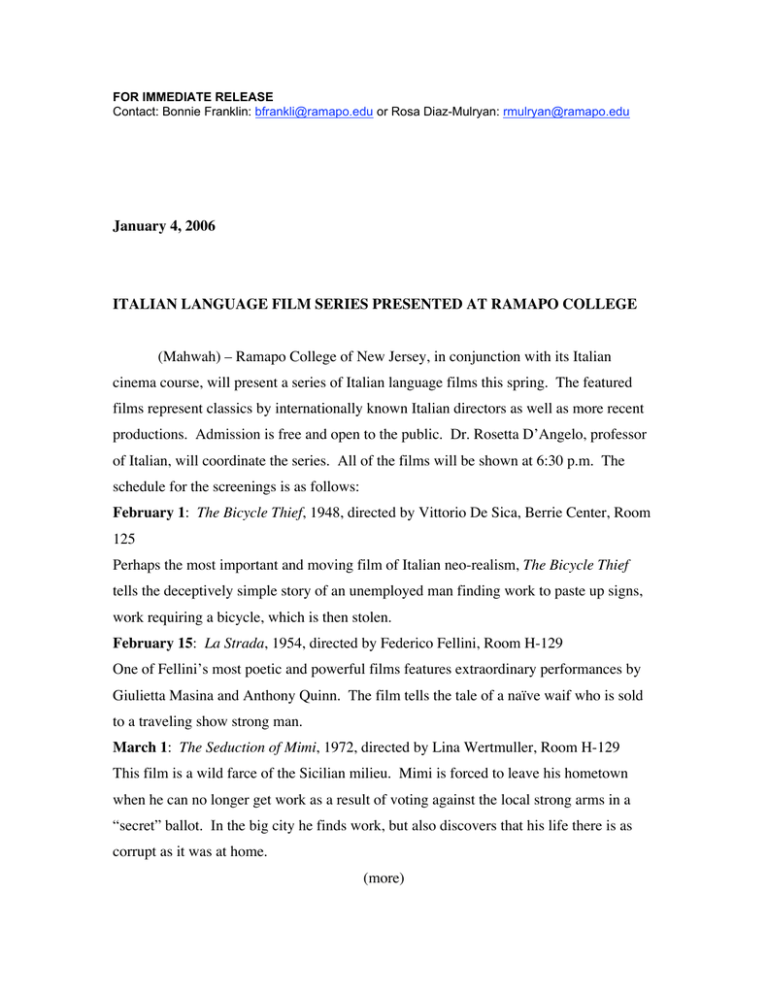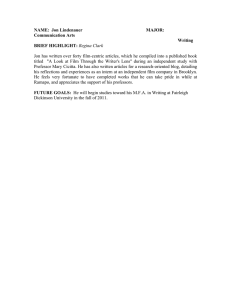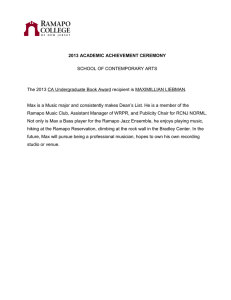January 4, 2006 ITALIAN LANGUAGE FILM SERIES PRESENTED AT RAMAPO COLLEGE
advertisement

FOR IMMEDIATE RELEASE Contact: Bonnie Franklin: bfrankli@ramapo.edu or Rosa Diaz-Mulryan: rmulryan@ramapo.edu January 4, 2006 ITALIAN LANGUAGE FILM SERIES PRESENTED AT RAMAPO COLLEGE (Mahwah) – Ramapo College of New Jersey, in conjunction with its Italian cinema course, will present a series of Italian language films this spring. The featured films represent classics by internationally known Italian directors as well as more recent productions. Admission is free and open to the public. Dr. Rosetta D’Angelo, professor of Italian, will coordinate the series. All of the films will be shown at 6:30 p.m. The schedule for the screenings is as follows: February 1: The Bicycle Thief, 1948, directed by Vittorio De Sica, Berrie Center, Room 125 Perhaps the most important and moving film of Italian neo-realism, The Bicycle Thief tells the deceptively simple story of an unemployed man finding work to paste up signs, work requiring a bicycle, which is then stolen. February 15: La Strada, 1954, directed by Federico Fellini, Room H-129 One of Fellini’s most poetic and powerful films features extraordinary performances by Giulietta Masina and Anthony Quinn. The film tells the tale of a naïve waif who is sold to a traveling show strong man. March 1: The Seduction of Mimi, 1972, directed by Lina Wertmuller, Room H-129 This film is a wild farce of the Sicilian milieu. Mimi is forced to leave his hometown when he can no longer get work as a result of voting against the local strong arms in a “secret” ballot. In the big city he finds work, but also discovers that his life there is as corrupt as it was at home. (more) -2March 15: Christ Stopped at Eboli, 1979, directed by Francesco Rosi, Berrie Center, Room 125 Carlo Levi, a doctor-painter from Turin, is condemned to exile by the Fascist Regime. He arrives at the train station in Eboli and is accompanied by two carabinieri to the desolate land of Lucania, to the village of Gagliano. Through his walks with his dog through the town, Carlo meets the different characters of Gagliano, listening to their stories and advice. April 5: The Night of the Shooting Stars, 1983, directed by the Taviani Brothers, H-129 A woman’s wish to tell her child the story of her Tuscan village during World War II, and of the villagers brave escape from fascism during the war’s final days, is the theme of this film. As she wishes on a shooting star, recollections of the daring plan and search for freedom come alive. April 19: Pane e tulipani (Bread and Tulips), 2000, directed by Silvio Soldini, H-129 Rosalba is a housewife in Pescara with teenage sons, married since 21 to a plumbing supplier whose mistress is her sister-in-law. When a tour bus leaves her, and her husband calls her to stay put, she rebels slightly and hitchhikes toward home, deciding on a whim to continue to Venice. Will duty and maternal instinct win out? Or will Rosalba stay in Venice, combining Rome’s rationality with Greece’s imagination to find her true self? May 3: Once you are born, you can no longer hide, 2005, directed by Marco Tullio Giordana, Room H-129 Sandro, the 12-year-old son of a young businessman from Brescia, goes off with his father and one of his father’s friends to cruise on a yacht in the Mediterranean. One night the boy falls overboard and is saved by Radu, a Romanian boy who is trying to reach Italy on a “junk” full of illegal immigrants. Sandro’s grateful parents offer to adopt Radu and his sister Alina, but as soon as the occasion arises, the two children rob them and run away. Sandro’s conscience give him no peace and he goes by himself to Milan, where he manages to raise Alina in a disused factory occupied by immigrants: then he will have to face a new and terrible truth. For further information please contact Dr. Rosetta D’Angelo, 201.684.7408. ####





